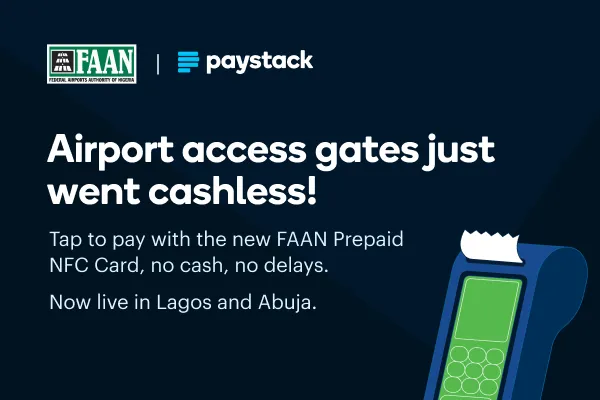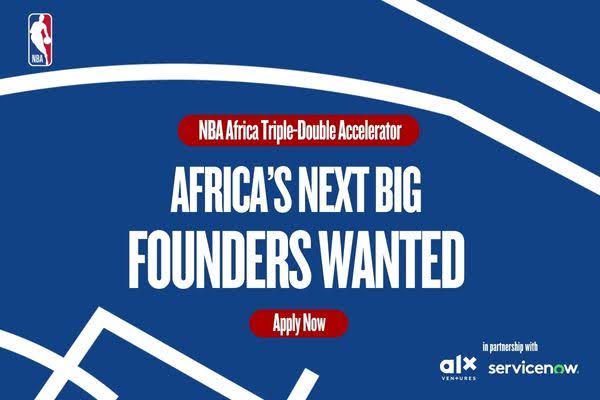- 👨🏿🚀TC Daily
- Posts
- NALA goes to Kenya
NALA goes to Kenya
Inside: iXAfrica secures $200 million debt.


TGIF! ☀️
If you don’t know yet, I’m going to hold your hand when I say this: Moonshot by TechCabal is next month!
I’ve never been to a big tech event, but I can't wait to meet the people shaping Africa’s tech ecosystem. At Moonshot, I’m looking forward to experiencing innovation from startups and understanding the policies that guide them. You don’t have to be a “tech person” to attend. There is tech in everything, and you'll see it for yourself.
Speaking of innovation, the NBA’s Triple-Double Accelerator is backing African startups solving real-world problems. Across fintech, healthtech, and sports-tech, this programme is helping African startups scale globally while building locally. Accelerators like these show just how exciting Africa’s tech scene is right now.
I’m excited for Moonshot 2025. You should be, too. And who knows, we might bump into each other in one of the content tracks. Until then, stay jiggy.
– Yemi
Let's dive in.

Features
🔥 Quick Fire with Ayodeji Alaran

Ayodeji Alaran, founder and CEO of PBR Life Sciences, is tackling Africa’s healthcare data problem. After 16 years at Pfizer, GSK, AstraZeneca, IQVIA, and Cegedim, he launched PBR in 2022 to help pharmaceutical companies cut waste and improve drug supply using anonymised pharmacy data.
Backed by Techstars, the startup has raised $1 million in pre-seed funding and operates in Nigeria, Ghana, Kenya, and the UK (HQ). With a global team, PBR helps life sciences firms forecast demand and plan smarter. Alaran holds a pharmacy degree from UNILAG, an MBA from London Business School, and executive training in marketing and pharmaceuticals.
Imagine a giant pile of LEGOs. Drug companies need those pieces to build medicines, but everything is scattered. My team and I use AI, a kind of robot brain, to sort the pieces, spot hidden patterns, and reveal which ones matter most. We then share those insights with scientists so they can build the right medicines faster. I don’t make the drugs myself; I lead the team that finds the secret instructions hidden in the data.
A pharmaceutical company in Lagos told us it destroyed $700,000 worth of expired medicines and still had to pay regulators for approval to do so. This is one company out of thousands in Africa that experiences the same challenge: poor data on disease and treatment patterns. Without it, pharma firms misjudge demand and the continent loses over $10.2 billion annually to waste and missed opportunities.
In my roles across Africa, the Middle East, Europe, and Asia, it was painful to see data driving innovation for patients in Europe while emerging markets were left out. It often felt like patients’ lives were valued differently, all because of poor data. I could not accept that and chose to act, so future generations would not ask why we stood by while the rest of the world advanced.
A pharmaceutical company once struggled with inflation, forex pressures, and pricing. Import too much and drugs expired, import too little and patients went without. Using our data, we analysed price elasticity for 30 products, tracking how patients responded to price changes, how doctors prescribed, and how pharmacies profited. This helped the company set optimal prices and quantities, contributing to revenue increase and product uptake by patients. The experience reinforced how big data, when mined for insights, can transform healthcare and create value for everyone.
The toughest part is cleaning unstructured healthcare data at scale. There are no standardised healthcare database dictionaries or AI models in Africa to guide data transformation. When we started, the 10,000+ drug brands and 480,000+ drug molecules in Nigeria were not classified according to WHO standards, which are the minimum for research and analysis.
Cleaning these unstructured datasets took 8-10 months on average, even as new data appeared every three months. The manual cycle was unsustainable. We built our own AI models and infrastructure, trained on initial datasets, and now we can clean new databases in 30 minutes, meeting global standards for research-quality data.
I have learnt how to quiet the noise and focus on the most important thing at every time. My core job is leading and empowering our people to ensure they are doing the best job of their lives and finding it fulfilling.
My faith as a Christian, spending time with my family, and playing the piano.
Ayodeji Alaran is a confirmed speaker at TechCabal’s Moonshot, happening on October 15–16, 2025. Connect with Alaran at Moonshot. Get your tickets.
eCommerce Without Borders: Get Paid Faster Worldwide

Whether you sell in Lagos or Nairobi, customers want local ways to pay. Let shoppers check out in their local currency, using cards, bank transfers, or mobile money. Set up seamless payments for your global online store with Fincra today.
Fintech
NALA makes debut in Kenya

NALA, a Tanzanian cross-border payments fintech, has entered Kenya through a partnership with Equity Bank and the national interbank payment system, Pesalink, to plug into the country’s booming remittances. This move will allow NALA route remittance through Pesalink’s payment rails, with Equity Bank handling settlements. For Kenyans, this means receiving diaspora funds in real time, directly into their wallets.
It’s a smart bet. Kenya pulled in $4.94 billion in remittances in 2024. By June 2025, cash wired into the country by Kenyans in the diaspora had risen to $2.519 billion, up from $2.4 billion in the same period last year. NALA already has users in the UK and the USA, the same corridors sending money to Kenya, so the fit is obvious.
The strategy isn’t new. Instead of seeking a standalone licence, NALA copied WorldRemit’s entry into Kenya, where the financial service provider partnered with the Co-operative Bank of Kenya to enable international money transfers.
But NALA’s competition is stacked. M-PESA rules Kenya’s mobile money sector, with a 90.8% market share and processing transactions worth over $296 billion annually. NALA’s record of facilitating over $1 billion in remittance transfers and raising $40 million to scale operations demonstrates that it can compete with Kenya’s established players. And this partnership gives it a fighting chance.
Shop anywhere with Paga's physical prepaid card

Own every checkout with Paga’s Physical Prepaid Card. Suitable for all your security and speed needs. Just fund, shop, and pay anywhere with confidence. Get yours today.
Funding
iXAfrica secures $200 million debt to expand Nairobi data centre

iXAfrica, a Kenyan data centre operator, received $200 million in debt from Rand Merchant Bank (RMB), the investment banking subsidiary of South Africa’s FirstRand Group with over 200 portfolio deals, to expand its data centres by 20 megawatts (MWs) of IT power. A move this big could see the local player become the most important data infrastructure provider in East Africa.
State of play: In February, iXAfrica announced plans to build NBOX1, a 2.25MW hyperscale data facility, in Nairobi. The funding from RMB, reportedly in tranches, will increase the capacity of that facility.
Why does this matter? Cloud demand is surging in the region. Safaricom, Kenya's largest telecom company, and several large corporations partner or work with iXAfrica to secure their data operations.
RMB is no first-timer in backing infrastructure-heavy projects. In 2024, it financed Wingu Africa's $60 million East Africa expansion, and in June 2025, it supported Africa Data Centres with $110 million to grow capacity in South Africa. Now, by investing in data centres, RMB is planting deeper roots in East Africa’s tech scene, where long-term contracts with banks and telecom companies can provide steady income.
Zoom out: While it's only debt, it could open doors for discussions about RMB joining iXAfrica’s bandwagon of strategic partners, potentially leading to expansion ideas the data centre operator has never been shy to talk about.
Paystack and FAAN are making airport access faster, safer, and cashless.

Paystack has partnered with the Federal Airports Authority of Nigeria (FAAN) to make airport access payments faster and easier. Learn more here →
Insights
Funding Tracker

This week, South African edtech company The Invigilator closed a $11 million funding round. Kaltroco led the investment round. (Sep 3)
Here are the other deals for the week:
- Koolboks, a Nigeria- and France-based cleantech startup, raised $11 million in Series A funding. The round was co-led by KawiSafi Ventures, Aruwa Capital, and All On, with additional debt financing from FFEM and bpifrance. (Sep 3)
- Clean energy startup MOPO secured $6.7 million from Norfund, Norway’s development finance institution. (Sep 4)
- Babban Gona, a Nigerian AI-powered agritech company, raised a $7.5 million debt round from the British International Investment (BII). (Sep 2)
- Egyptian fintech Munify raised $3 million in seed funding, led by Y Combinator and with participation from BYLD and Digital Currency Group. (Sep 3)
- Morocco-based e-commerce startup Justyol raised $1 million in a combined funding and financing round. The funding package comprises $400,000 in equity investment from an angel investor, complemented by $600,000 in inventory financing from Turkey’s Danis Group. (Sep 2)
Follow us on Twitter, Instagram, and LinkedIn for more funding announcements. Before you go,did you know that stablecoins captured 43% of Africa's crypto volume in 2024? Here’s how.
Apply for NBA's Triple-Double startup accelerator

The NBA Africa Triple-Double Accelerator is back, funding bold African startups ready to grow fast. Sports, media, tech, or youth innovation, if you’re building big, this is your shot. Apply before September 9, 2025.
CRYPTO TRACKER
The World Wide Web3
Source:

Coin Name | Current Value | Day | Month |
|---|---|---|---|
| $111,509 | + 0.22% | - 2.09% | |
| $4,335 | - 1.03% | + 19.77% | |
| $0.02069 | + 1.11% | - 80.72% | |
| $204.32 | + 1.07% | + 25.01% |
* Data as of 06.10 AM WAT, September 5, 2025.
Win a part of $30,000 at Moonshot by TechCabal 2025

Are you a West African startup innovating in creativity, tech & entrepreneurship? Here’s your chance to win from a prize pool of $30K and pitch live at Moonshot by TechCabal Lagos! Click here to apply.
Events
Entertainment Week Africa (EWA)—formerly Entertainment Week Lagos—returns to Lagos on November 18–23, 2025. Now a pan-African platform for the $58.4 billion creative economy, EWA has drawn 53,000+ attendees across film, music, fashion, and tech. This year’s edition introduces a dedicated film and music content market where artists, labels, directors, and publishers can pitch, licence, and sell directly to buyers and investors, supported by hands-on clinics to prep them for meetings. It will also feature a 50-company job fair, an expanded deal room accelerator with a ₦25 million seed fund, and more film premieres under the theme “Close the Gap.” Learn more here.

Written by: Emmanuel Nwosu, Opeyemi Kareem, Ifeoluwa Aigbiniode, and Stephen Agwaibor
Edited by: Ganiu Oloruntade
Want more of TechCabal?
Sign up for our insightful newsletters on the business and economy of tech in Africa.
- The Next Wave: futuristic analysis of the business of tech in Africa.
- TC Scoops: breaking news from TechCabal
- TNW: Francophone Africa: insider insights and analysis of Francophone's tech ecosystem
P:S If you’re often missing TC Daily in your inbox, check your Promotions folder and move any edition of TC Daily from “Promotions” to your “Main” or “Primary” folder and TC Daily will always come to you.

How did you find today's edition of #TCDaily? |


